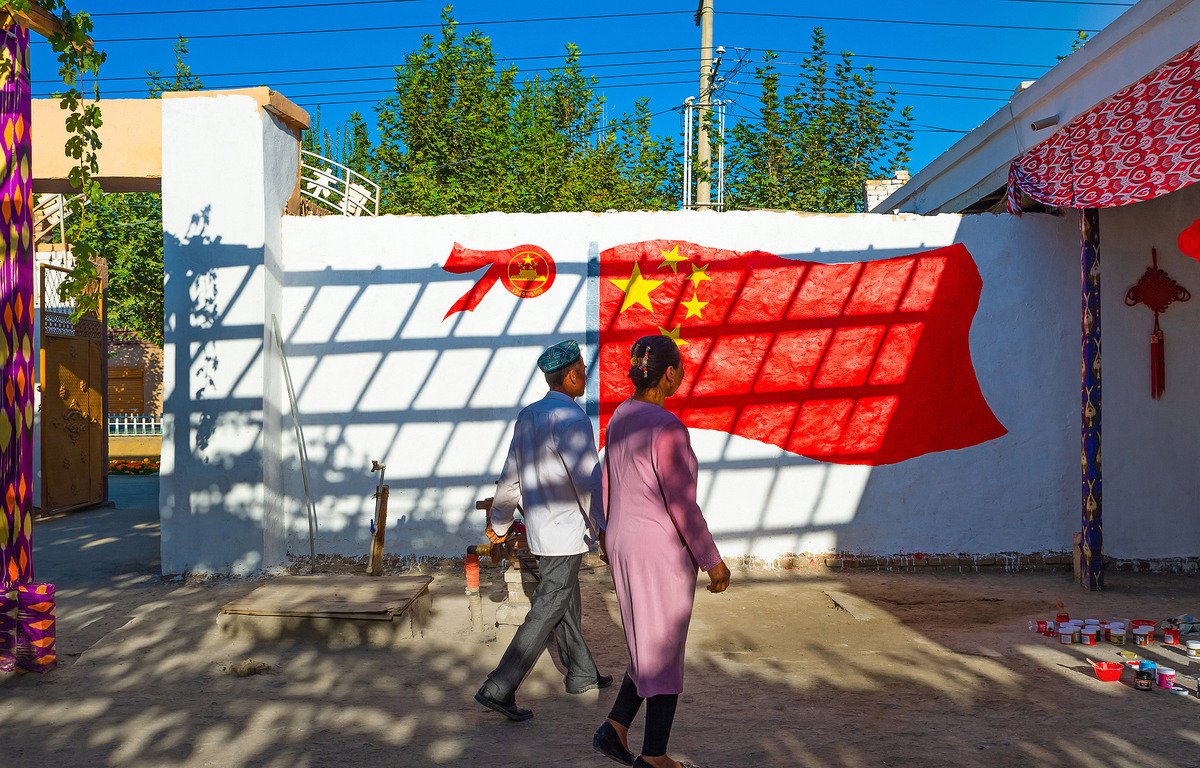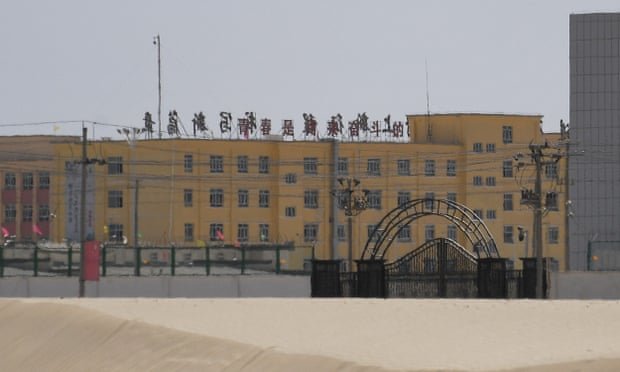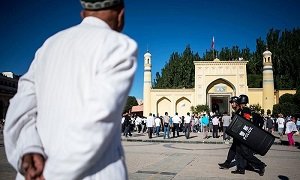 Two local farmers walk past a residential house painted with a Chinese flag in Makit county, Kashgar, Xinjiang Uygur autonomous region, Sept 23, 2019.
Two local farmers walk past a residential house painted with a Chinese flag in Makit county, Kashgar, Xinjiang Uygur autonomous region, Sept 23, 2019.
Herald Report
China has criticized the passage of a Xinjiang-related bill by the United States House of Representatives, urging Washington to stop pushing the bill to become law.
China will respond further if necessary, reports ChinaDaily.com quoting Foreign Ministry spokeswoman Hua Chunying’s online statement.
“The Uyghur Human Rights Policy Act of 2019 smeared the human rights situation in Xinjiang Uygur autonomous region, slandered China’s efforts to crack down on extremism and terrorism and attacked the Chinese government’s policy in the region,” Hua said.
The government of Xinjiang autonomous region lawfully fought violent and terrorist crimes while addressing the root causes, making efforts to advance de-radicalization, economic growth, ethnic solidarity, social harmony, and stability, according to Hua.
Thanks to those efforts, Xinjiang hasn’t seen a single terrorist attack over the past three years, she said, adding that those endeavors are endorsed by all 25 million people of various ethnic groups in Xinjiang and also mark China’s contribution to the global counter-terrorism cause, the report claims.
Since the end of 2018, over 1,000 representatives have visited Xinjiang in more than 70 groups, including officials from various countries, regions and international organizations, and people from the press, religious groups, and the academic circle.
They acclaimed that Xinjiang’s experience in counter-terrorism and de-radicalization was worth learning from, the spokeswoman said.
In March this year, the Council of Foreign Ministers of the Organization of Islamic Cooperation adopted a resolution that commended China’s efforts “in providing care to its Muslim citizens”.
In July, ambassadors of over 50 countries to the UN Office at Geneva co-signed a letter to the president of the UN Human Rights Council and the High Commissioner for Human Rights, applauding China’s respect and protection of human rights in its counter-terrorism and de-radicalization efforts.
In October, at the Third Committee session of the 74th UN General Assembly, more than 60 countries commended in their statements the human rights progress achieved in Xinjiang.
All those are strong proof that the US accusations on Xinjiang-related issues are entirely against facts and the mainstream public opinion of the international community, Hua said.
She noted that the bill passed by the US House of Representatives will only reveal the double standards the US has adopted in anti-terrorism as well as its hypocrisy and wicked intention.
The US was using Xinjiang-related issue to sow discord among various ethnic groups in China, undermine Xinjiang’s prosperity and stability, and curb China’s development, she said, adding such attempts will not succeed.
The so-called Act has distorted and smeared China’s efforts in fighting extremism and terrorism by making “groundless accusations against Chinese government’s policies in Xinjiang,” the Foreign Affairs Committee of the National People’s Congress, China’s top legislative body, said.
The act is a crude move to interfere in China’s internal affairs and severely violates the basic principles of international relations, the Foreign Affairs Committee of the Chinese People’s Political Consultative Conference said.
Bypassing the act, the US is actually supporting terrorism which will severely damage international counter-terrorism cooperation, said National Ethnic Affairs Commission.
Some foreign media outlets and officials have been stirring up the Xinjiang issue, and attacking the autonomous region’s education and training work that aims to help people break free from extremism, claimed Shohrat Zakir, chairman of the Xinjiang regional government.
The Uighur Act 2019
The US House of Representatives has approved a bill that would require the Trump administration to toughen its response to China’s crackdown on its Muslim minority in Xinjiang, drawing swift condemnation from Beijing, reports The Guardian Newspaper.
The Uighur Act 2019 is a stronger version of a bill that angered Beijing when it passed the Senate in September. It calls on the president, Donald Trump, to impose sanctions for the first time on a member of China’s powerful politburo even as he seeks a trade deal with Beijing.
The Uighur bill, which passed by 407-1 in the Democratic-controlled House, requires the president to condemn abuses against Muslims and call for the closure of mass detention camps in Xinjiang.
It calls for sanctions against senior Chinese officials specifically the Xinjiang Communist Party secretary Chen Quanguo, who is responsible.
The revised bill still has to be approved by the Republican-controlled Senate before being sent to Trump.

China’s foreign ministry said the bill was “arrogantly discrediting China’s efforts to combat terrorism” and seriously interfering in China’s internal affairs. In a statement, it said the situation in Xinjiang was “not a human rights, nationality, or religion issue at all, but an issue of anti-terrorism and anti-secession”.
The ministry said the US plan to use Xinjiang to “undermine Xinjiang’s prosperity and stability and curb China’s development” will fail. “We urge the US to immediately correct its mistakes, prevent the Xinjiang-related bill from becoming law, and stop using Xinjiang-related issues to interfere in China’s internal affairs. China will respond accordingly to the development of the situation.”
The Chinese state-owned tabloid The Global Times quoted experts as saying Beijing will take “strong countermeasures”.
China has denied any mistreatment of Uighurs and says the camps are providing vocational training. It has warned of retaliation “in proportion” if Chen were targeted.
Analysts say China’s reaction to passage of the Uighur bill could be stronger, although some doubted it would go so far as imposing visa bans on the likes of the US secretary of state, Mike Pompeo, who has called China’s treatment of Uighurs “the stain of the century” and has been repeatedly denounced by Beijing.
Global Times, a tabloid published by the official People’s Daily newspaper of China’s ruling Communist Party, tweeted that Beijing would soon release a so-called unreliable entities list imposing sanctions against those who harm China’s interests.
It reported that China was expediting the process for the list because the US House bill would “harm Chinese firms’ interests”, and that “relevant” US entities would be part of Beijing’s list.
The Democratic House speaker, Nancy Pelosi, called China’s treatment of the Uighurs “an outrage to the collective conscience of the world”, adding that “America is watching”.
“Today the human dignity and human rights of the Uighur community are under threat from Beijing’s barbarous actions, which are an outrage to the collective conscience of the world,” she said shortly before the vote.
Chris Johnson, a China expert at Washington’s Center for Strategic and International Studies, said passage of the bill could lead to a further blurring of lines between the trade issue and the broader deteriorating China-US relationship, which Beijing in the past has tended to keep separate.–Additional reports from AFP, Reuters

The High Asia Herald is a member of High Asia Media Group — a window to High Asia and Central Asia

